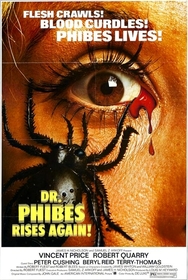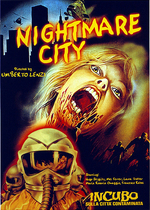Our editor-in-chief Nate Yapp is proud to have contributed to the new book Hidden Horror: A Celebration of 101 Underrated and Overlooked Fright Flicks, edited by Aaron Christensen. Another contributors include Anthony Timpone, B.J. Colangelo, Dave Alexander, Classic-Horror.com's own Robert C. Ring and John W. Bowen. Pick up a copy today from Amazon.com!
Dr. Phibes Rises Again (1972)
Some sequels are so intrinsically linked to their predecessors that they are nearly impossible to analyze on their own merits. For instance, Dr. Phibes Rises Again, released a mere fourteen months after The Abominable Dr. Phibes, relies heavily on the momentum of the earlier film. Because of the inevitable comparisons that arise in a situation like this, we can't help but see the cracks and flaws in Dr. Phibes Rises Again; this sequel does not "rise again" to the greatness of its forebear. Yet, despite this disappointment, the film still entertains and thrills.
Dr. Phibes Rises Again starts with exactly what is on the label. Dr. Phibes (Vincent Price) awakens three years after the conclusion of the first film. He gets on his rising organ only to discover, horror of horrors, that his magnificent home has been destroyed in his years of slumber. Worst of all, his parchment scrolls telling of the location of the Pharaoh's Tomb have been stolen. The Pharaoh's Tomb, of course, holds the secret of the River of Life, the only place that can possibly revive Phibes's beloved wife, Victoria. Phibes quickly murders those responsible and regains his parchment, but is soon engaged in a race against an archaeological team led by Darius Biederbeck (Robert Quarry) to unlock the secrets of the Pharaoh's Tomb - a race Phibes intends to win by killing the opposition, one by one.
The first flaw worth mentioning is the lack of a coherent theme to unite the killings. The murders in Abominable Dr. Phibes are brilliant plays on the ten plagues of Egypt, interpreted in interesting and unexpected ways (the crushing frog mask, the unicorn impalement). However, in Dr. Phibes Rises Again, there is only a loose desert theme to connect the killings. Individually, some of the murders are very clever (pay particularly close attention to the Turn of the Screw killing), but they don't hold together in an entertaining way. Now, this is not to say that there aren't individually dull murders in the first film; there are more than a few, but the genius of the ten plague theme masks some of the ridiculousness. The weaker unifying theme in Rises Again make the weaker killings seem downright sad. A sandblaster hidden in a car to murder an old man is just bad form. That said, this flaw is not a fatal one, especially since the great deaths do outnumber the poor ones.
The other major flaw of Dr. Phibes Rises Again is its insistence of including the characters of Inspector Trout (Peter Jeffrey) and Sir Waverly (John Cater), for no other reason than that they were also in the first film. Once again, they are chasing Phibes, but this time their actions have no consequence or effect on the main plot. Their scenes do provide some amusing banter as well as appearances from great character actors such as Peter Cushing and Terry-Thomas, but these are merely distractions. Even admirable performances by Jeffrey and Cater cannot overcome the fact that their scenes are hiccups in pacing that could be easily excised.
As for the merits of the sequel, they are in fact many of the same things that make the first installment so great. The sets are lavish and colorful and the clockwork creations of Dr. Phibes have their kitschy charms. But, perhaps most notably, Vincent Price again dons the waxy visage of the surgeon/concert organist Anton Phibes in another magnificent performance. When he soliloquizes to his dead wife, without the ability to actual emote with his face, he still draws you in with his body language and his expressive eyes. The limitations that Price overcomes, particularly the ever-present wax mask, makes his performance masterful. He has so little to work with, yet he expresses so much. Often sadly overlooked, Phibes is one of those characters, thanks to Price's performance, that should be one of the icons of horror.
Supporting Price in the film is Robert Quarry as Darius Biederbeck, Phibes's main competitor for the secrets of the Pharaoh's Tomb. Quarry brings a lot of charm to his part, like an old-school Hollywood Cary Grant-type blended with the strong shoulders and demeanor of Oliver Reed. Biederbeck is an elaborate character, a man who has been taking an elixir that has prolonged his life for hundreds of years, but is now running out of his magical liquid and must seek the same thing as Phibes: the Pharaoh's River of Life. Quarry's composure as Biederbeck, his physical poise, and his stern dulcet tones, all make for a compelling performance, and a worthy foe for Price's Phibes.
Indeed, it is the contrast of Biederbeck and Phibes that are what forms the intriguing moral dichotomy of the film. They are two men seeking the same thing, the secret of eternal life. Biederbeck deals dirtily in his quest for the goal, but he does not out-and-out resort to murder as Phibes does. He has his own (living) love, to whom he seems to act quite cold. This contrasts perfectly with the adoration that Phibes pours onto the cold, lifeless body of his beloved Victoria. By the film's conclusion, it's clear that Biederbeck is fueled entirely by self-interest, while Phibes is motivated by a deep and abiding love for his wife. Somehow this makes Phibes's actions, while repugnant, purer - and more acceptable - to the viewing audience.
To cap it all off, the film's final scene is bloody fantastic . Rarely have I loved forty seconds of film as much as I love the conclusion of Dr. Phibes Rises Again. Biederbeck, locked out of the River of Life by big metal gates, ages before our eyes, his quest ending in failure. Phibes, driving his boat with the body of his beloved Victoria down the river, bursts into song - "Somewhere Over the Rainbow" - in a call back to the end credits of the first film. It's pure, unadulterated joy that never fails to put a smile on my face.
I watched Dr. Phibes Rises Again expecting disappointment, and I found myself mildly surprised. I enjoyed the film, flaws and all. While there were factors I did not enjoy, and it is far from a perfect (or even great) film, I loved it. Price and Quarry delivered great performances, the plot brought me delightful black humor in its killings, the sets were colorful and grand, and the ending had me grinning like an idiot. There's a lot of cracks in the finish, but there's also a lot to enjoy. The best way to gauge whether you'll enjoy the film is if you enjoyed its predecessor. And if you haven't seen The Abominable Dr. Phibes yet, well, you owe it to yourself to do so.
This review is part of our Shocktober Classics 2009: Staff Screams event.









I beg to differ my opinion.
I beg to differ my opinion. It's a quirky Murder on the Nile meets the Mummy meets Phibes dark parody in search of life rejuvenation ala SHE. I loved the ending twist with Wincent Price singing SOMEWHERE OVER THE RAINBOW. iT WAS SARDONIC, IROMIC AND HUMOROUSLY UP LIFTING.
Actually the murders in both
Actually the murders in both films seem to be somewhat related. I've listed the deaths from the first film followed by one in the second that seems pretty simiar:
Killed by Bats -> Killed by hawk
Crushed by Frog Mask -> Crush by "Screw" Machine
Killed by Brass Unicorn -> Killed by Golden Snake (both were impaled)
Killed by Crawling Locusts -> Killed by Crawling Scorpians (both invertebrates)
Killed by Blowing Hail -> Killed by Blowing Sand
Killed by Lack of Blood -> Killed by Lack of Air
The last attempted murders in each film were targeted at loved ones and both failed.
Hello Dr. Theda here I was
Hello Dr. Theda here I was lucky enough to obtain the Dr. Phibes 12 inch figures.... I own a copy of the novel... The Dr. Phibes character is and has been one of my biggest "idols" since childhood....